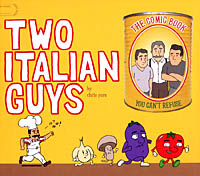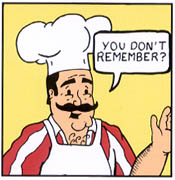 By Chris Yura
By Chris Yura
36 pages, color
Published by Mangia Industry
Every now and then, a book shows up in my mailbox that I’ve never heard but instantly grabs my attention. Two Italian Guys by Chris Yura did that, published in a landscape format and with a slick, attractive hardback cover. With this attention to publishing quality, it ended up quickly shifting up to the top of the to-read pile (although having three grandparents being immigrant families from Italy probably didn’t hurt my interest). What I found inside, though, was one of the stranger comics I’ve read in a while.
There are really three different stories in Two Italian Guys, and aside from ethnicity there’s no connection between them. The book opens with a story of a mob hit, as two men in organized crime talk about a recent killing, and then we see their own working relationship explode. It’s a story that feels longer than it actually is, told in a rambling fashion that seems to stretch on and on. Our two nameless mafia members are irritating and annoying, deliberately racist and boors that do everything but jump up and down with signs saying, "Unlikable." By the time you hit the sixth page, you’ll hope to never have to see them again. And then, with no warning, that’s exactly what we get. The book promptly shifts into the first of two stories about a local television chef, Lou Peppino, who continues to insult and offend his way through the taping of an episode of his show. It’s a strange non-sequitur moment, leaping into a studio where anthropomorphic vegetables get insulted by (and talk back to) Lou, and ends with a recipe for marinara sauce. It’s at least mildly amusing, but its lack of connection in any way to the previous story is a little bewildering.
 It’s only then that the book finally gets into the title story, with two young men talking about work woes and their past with their aging father. It’s the best part of Two Italian Guys by a mile, opening with a flashback about immigrating from Italy and then moving into the present day. The story itself is short and mostly unresolved, with promises of additional volumes down the line, but this core of the book at least has a slight hook to make readers interested. If all of Two Italian Guys had just been about this family, perhaps giving us some more plot development, I think it would’ve been much more successful. Instead it feels like the book stops just after it finally gets started. It doesn’t help that it ends with more Lou Peppino, in a story about trying to get a table at a restaurant that is predictable and surprisingly not funny. It’s actually irritating to see Lou show up at this point, right when the book had begun to show some real potential.
It’s only then that the book finally gets into the title story, with two young men talking about work woes and their past with their aging father. It’s the best part of Two Italian Guys by a mile, opening with a flashback about immigrating from Italy and then moving into the present day. The story itself is short and mostly unresolved, with promises of additional volumes down the line, but this core of the book at least has a slight hook to make readers interested. If all of Two Italian Guys had just been about this family, perhaps giving us some more plot development, I think it would’ve been much more successful. Instead it feels like the book stops just after it finally gets started. It doesn’t help that it ends with more Lou Peppino, in a story about trying to get a table at a restaurant that is predictable and surprisingly not funny. It’s actually irritating to see Lou show up at this point, right when the book had begun to show some real potential.
 The art in Two Italian Guys is cartoonish but not bad, especially once we get into the main story. I liked Yura’s drawings of old Italy, and the simple style works well for these characters. They look a little silly but they’ve got heart, which is important for a story like this. Some of the page layouts felt a little too cluttered, and I suspect the landscape dimensions of the page probably didn’t help matters. Still, it’s not bad. I wasn’t as happy with the art in the opening vignette, though, which doesn’t feel tonally with the rough, nasty moments that happen throughout its pages. It ended up making me feel even more disconnected from that story, and since it’s the opening of Two Italian Guys, that’s a bad way for a book to open.
The art in Two Italian Guys is cartoonish but not bad, especially once we get into the main story. I liked Yura’s drawings of old Italy, and the simple style works well for these characters. They look a little silly but they’ve got heart, which is important for a story like this. Some of the page layouts felt a little too cluttered, and I suspect the landscape dimensions of the page probably didn’t help matters. Still, it’s not bad. I wasn’t as happy with the art in the opening vignette, though, which doesn’t feel tonally with the rough, nasty moments that happen throughout its pages. It ended up making me feel even more disconnected from that story, and since it’s the opening of Two Italian Guys, that’s a bad way for a book to open.
I wanted to like Two Italian Guys a lot more than I actually did. Yura’s got great ambition, but I think as a debut graphic novel he might have been better suited to telling a singular and more complete story the first time out. Maybe future volumes will connect these characters, but right now it just feels scattered and incomplete. I don’t feel like I wasted my time, but at the same time I’m not sure I would pick up a second volume without hearing a lot of positive words first. At the end of the day, the best thing about Two Italian Guys is the production values of the printing of the book, the original attraction I felt when it showed up in my mailbox. I just wish it had hung onto that potential from start to finish.
Purchase Links: Amazon.com | Powell’s Books
